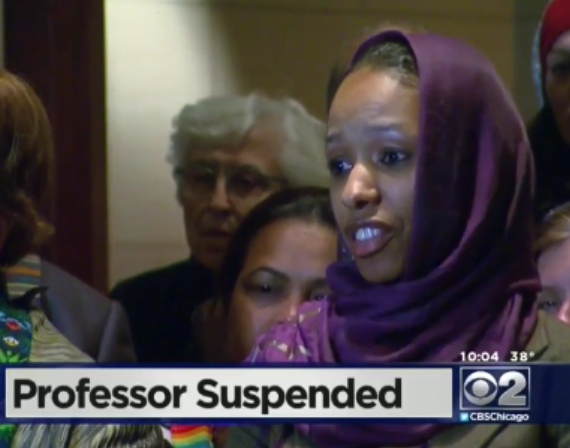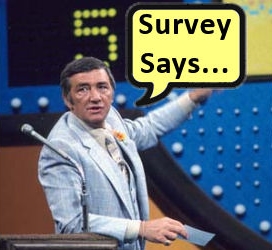 A number of Christian academic bloggers have weighed in on the Wheaton controversy about Dr. Larycia Hawkins, specifically her statement that Christians and Muslims worship the same god.
A number of Christian academic bloggers have weighed in on the Wheaton controversy about Dr. Larycia Hawkins, specifically her statement that Christians and Muslims worship the same god.
- If you haven’t been following the whole thing, blogger Fr. Alvin Kimel summarizes it well in this post at Eclectic Orthodoxy. There, and in a follow-up post, like me he gives an affirmative answer – yes, Christians and Muslims are talking about the same one. I also agree with this statement of his: “So what practical difference does all of this make?” It clears away the underbrush for purposes of evangelism, ecumenical dialogue, and further theological reflection.”
- You can see a PBS news interview with Dr. Hawkins here. It seems to me that her main interests are political; she is an activist sort of professor. The American evangelical world has its own theological political sphere in addition to the one everyone else lives in. And so a firestorm ignited when she echoed the popular popes Francis and John Paul II with her “same god” comment – even though theology was far from being her main interest. The Wheaton administration invoked their statement of faith and suspended her for violating it.
- Which part? Their original statement is wholly unclear on which part she violated.
- Reading between the lines, perhaps they are concerned that her statement might lead some people to think that the differences between Christianity and Islam an not important, and that some Muslims might gain salvation without converting to Christianity. Again, this is speculation, but to my eyes they seem to be over-reacting to an ambiguous statement that might suggest to some people a theory of religious pluralism or inclusivism. Hence their emphasis on fundamental differences between the two religions.
- In later statements, they only say (paraphrasing) that she has not yet satisfied the Wheaton Inquisition.
- But how so? What have other recently investigated faculty strongly affirmed that she has denied or at least not enthusiastically enough affirmed?
- Starting at about 4:45 in the PBS interview, she points about that many Christians, and even evangelicals have said the same thing. (In this connection we could mention President Bush.) And yes, of course, the religions differ in what they teach about God. After 6:00 she says things that suggest that she’s committed to the falsity of any sort of religious pluralism. At 7:20ff she very carefully and minimally describes the Inquisition process, insisting that it’s all been in a spirit of brotherly love. (I doubt this; read on.) Note that at the end of the interview she leaves the door open to later claiming that Wheaton has been unduly motivated in all of this by her race. This makes me think there isn’t going to be any reconciliation here…
- Again, I wonder if the theological issue is inclusivism, or simply whether any non-Christians may be saved. There are surely some at Wheaton who would insist on denying both, and who would as it were disfellowship a fellow evangelical for not doing so. My outsider’s understanding is that it is typically Wheaton’s governing board which is ultra-conservative, with administrators, faculty, and students holding a whole range of less hard-line views, but forced to salute and at least outwardly comply with them regularly.
- According to a more recent newspaper report, that loving feeling seems to have gone. There’s a history of them investigating her for other matters touching on leftist political theology and sexual political issues. I have to wonder how much this is about politics rather than theology. It’s not easy to be a Republican in overwhelmingly liberal state colleges. And it’s not easy to be a Democrat in overwhelmingly conservative American evangelical institutions. In any, case, evidently she’s done jumping through hoops to prove the correctness of her theology. The college says, “”On the part of the College, further theological clarification is necessary before such reconciliation can take place, and unfortunately Dr. Hawkins has stated clearly her unwillingness to participate in such further clarifying conversations,” the college said in a statement. “This represents an impasse on our efforts toward reconciliation.”
- Just to give you a taste of the passions this has aroused in the wider public, one blogger (not connected with Wheaton) screeches “Islam is in no way like Christianity, and this woman is a fraud.” Obviously false, and quite mean and uncharitible, respectively, for the record.
- Christian metaphysician and analytic theologian Dr. Michael C. Rea weighed in with a column arguing the affirmative, and also questioning the actions of Wheaton’s administration. He takes for granted that Muslims do in fact worship a god, and since there’s only one god, we Christians think, then this must be the same one we worship. (Even though, of course, we disagree in what he teach about God.) This is clearly argued, but I think a bit too simple, for reasons I get into in my second post on all of this.
- Analytic theologian Dr. James Anderson has two excellent recent posts on these matters: “The Same God? A Plea for Precision” and “On Contradicting the Bible“. In this latter, he insightfully says “Now suppose you think, as is plausible, that when the Quran says that God has no son (Q4:171; Q6:101) it’s contradicting the Bible (John 3:16, etc.). In that case, you’re presupposing that the Quran is referring to the same God as the Bible.”
- Analytic theologian Dr. Randal Rauser asks ““What does it mean to say two people are worshipping the same God?” In fact, it seems to me that folks are assuming a lot when they ask the
 question, and perhaps some of those assumptions need to be examined more closely.” Then he tells a true-life story which is obviously inspired by Jesus’s parable of the good Samaratin. I’m guessing that about reference, his view is positive, like Rea, Anderson, Beckwith, Kimmel, and me.
question, and perhaps some of those assumptions need to be examined more closely.” Then he tells a true-life story which is obviously inspired by Jesus’s parable of the good Samaratin. I’m guessing that about reference, his view is positive, like Rea, Anderson, Beckwith, Kimmel, and me. - In this post Dr. Lydia McGrew takes a negative view. In part, “Just as it is understandable that a Jew who has not converted to Christianity believes that the Christian and he do not worship the same God, and this does follow from his premises, so it is with Christianity and Islam. The Muslim, whose religion changes the concept of God in important ways from that of the Judeo-Christian tradition, claims that there is an essential continuity, but the Christian, as long as he remains a Christian and not a Muslim, should reject this.”
- I argue back in some comments there. I think that she’s just insisting on reading “the same god” claim as saying that the Christian God and the Islamic Allah don’t differ in any important respects. Well, of course they do – I mean, the two traditions teach somewhat different things about God! But my point is about reference, not about the equality or essential similarity of the various theologies. I suggest that we should just clarify the claim that “Christians and Muslims worship the same god” by adding that all this means is that they both are talking about and directing their worship towards the god of Abraham, even while differing quite a bit on that God’s properties, actions, and will.
- My friends Dr. Dan Howard-Snyder on Facebook, and Dr. William Vallicella (the Maverick Philosopher) in this post have struck up a skeptical stance about whether or not Muslims are referring to the same god Christians are referring to. Dr. Vallicella takes on me and also Roman Catholic philosopher Dr. Francis J. Beckwith.
- Dr. Beckwith had posted “The fact that one may have incomplete knowledge or hold a false belief about another person – whether human or divine – does not mean that someone who has better or truer knowledge about that person is not thinking about the same person.” Similarly, he points out that on the level of philosophy, many Christian, Muslim, and Jewish intellectuals have embraced a pretty similar “classical theism.”
- About my view, I’m still cogitating on Dr. Vallicella’s objections. I do think that he’s gone out on a limb by asserting that people can’t experience God so as to be able to just refer to him by acquaintance, with or without many correct beliefs about his essence or actions. I’m also disinclined to think that we need to have a full-blown theory of reference to settle this question, just as we don’t have to posses a fully-developed theory of knowledge to know that we can know by memory what happened five minutes ago.
- In another post, I hope this week or next, I’ll try to say why I’m standing firm in my positive answer, despite the objections of McGrew, Howard-Snyder, and Vallicella.

William Lane Craig has also decided to take a stab at the issue: http://www.reasonablefaith.org/do-christians-and-muslims-worship-the-same-god
Theologian Peter J Leithart has written a blog article in support of the viewpoint of Wheaton College administration in First Things: http://www.firstthings.com/blogs/leithart/2015/12/muslims-and-christians
Dalton, Rutherford, and Bohr had very different models of the atom, but they clearly all believed in
atoms. One can grant that and at the same time say that it’s important for chemists to hold the *correct* view of atoms. Not all models are equally true or true-for-them.
https://en.wikipedia.org/wiki/Perennial_philosophy
Perennialism is a perspective within the philosophy of religion which views each of the world’s religious traditions as sharing a single, universal truth on which foundation all religious knowledge and doctrine has grown. According to this view, each world religion, including but not limited to Christianity, Islam, Judaism,Hinduism, Taoism, Confucianism, Shinto, Sikhism, and Buddhism, is an interpretation of this universal truth adapted to cater for the psychological, intellectual, and social needs of a given culture of a given period of history. The universal truth which lives at heart of each religion has been rediscovered in each epoch by saints, sages, prophets, and philosophers. These include not only the ‘founders’ of the world’s great religions but also gifted and inspired mystics, theologians, and preachers who have revived already existing religions when they had fallen into empty platitudes and hollow ceremonialism.
Who is the True God??? But the bigger questions is if God the father doesnt look like a man what does his appearance looks like???? According to muslims God doesnt look like a man so what does this allah look like….Nobody knows what satan looks like whether he looks like humans or some creature
YHWH says:
He doesn’t lie. (He might give you what you want after you refuse the truth, but He doesn’t lie.)
Earth’s land rose up from beneath the ocean.
You should not bear false witness.
Treat people, even non-believing sojourners as you would yourself. Murder is a sin.
Divorce is a sin.
Allah says:
He is the best liar.
Earth’s land was laid like a carpet with the mountains as tent pegs to hold it down.
You should lie about your specific beliefs when muslims aren’t in the majority.
It’s okay to kill people because they aren’t muslims. Also, cut off fingers, oppress them, enslave them.
Divorcing your property is super simple, just say, “I divorce you,” three times and boom.
Looks like….
There are some stark differences there.
Comments are closed.